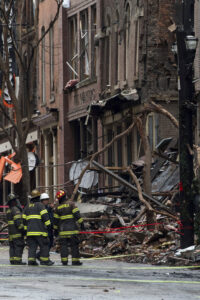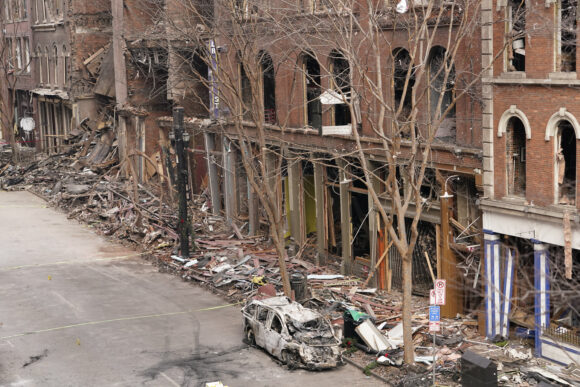When a Tennessee man set off a bomb in downtown Nashville in 2020, it not only disrupted a peaceful Christmas morning in the city, it put some nearby establishments out of business for more than 30 months.
The vehicle blast, which killed the conspiracy-believing driver and perpetrator, damaged some 45 properties and disrupted cell phone and internet operations in the area, also caught the attention of the insurance industry. Stakeholders wondered if the FBI would decide if it was an act of terrorism, thus triggering terrorism exclusions in insurance policies.
Now, one of those businesses hit hard by the explosion, a once-popular bar known as Beer Sellar, has filed suit against its insurer, United States Liability Insurance Co., signaling that it may take years of litigation to decide if coverage was due under the amended exclusions in the bar’s policy. The case, initially filed in state court in Nashville, was transferred by U.S. Liability last week to federal court for the Middle District of Tennessee.
The complaint alleges that the insurer, which has paid $174,751 on its policies, breached its contract by failing to fully pay for property damage and business interruption losses.
“Particularly egregious, defendant issued no lost-business income payments to Beer Sellar after June 2021, even though Beer Sellar has not been able to reopen its business and has been unable to access the insured premises,” reads the complaint. The establishment in the Printers Alley section known for its nightlife, had been in operation for more than 20 years and had done extensive remodeling to the property.
U.S. Liability also engaged in deceptive delaying tactics so that any legal action by Beer Sellar would come after the Tennessee’s two-year statute of limitations had expired, the plaintiffs’ attorneys allege. To counter that limitation, Beer Sellar argues that the insurance contract was signed at the bar’s home offices in South Carolina, which has a three-year statute of limitations. The insurance company also failed to give 30-day notice that the Tennessee limitations deadline was imminent, according to the court document.
The policy in question, attached to the lawsuit complaint, excludes coverage for certified acts of terrorism. But an endorsement on the policy appears to override that: “The referenced exclusion shall not apply to loss or damage caused directly or indirectly by ‘certified acts of terrorism’ under the provisions of the federal Terrorism Risk Insurance Program Reauthorization Act of 2015,” the endorsement reads.

Beer Sellar, owned by Rude Ham, formerly known as Downtown Nashville Bar Limited Partnership, in fact, purchased terrorism coverage for an extra $900 in premium, the policy appears to indicate.
In March 2021, three months after the bombing, the FBI issued its report, finding that deceased suspect Anthony Warner was driven by far-fetched conspiracy theories, but that his actions were not related to terrorism.
“The FBI’s analysis did not reveal indications of a broader ideological motive to use violence to bring about social or political change, nor does it reveal indications of a specific personal grievance focused on individuals or entities in and around the location of the explosion,” the FBI said in a bulletin at the time.
It also stated: “It is important to note that only Warner knows the real reason why he detonated his explosive device.”
U.S. Liability has not yet filed an answer to the lawsuit in federal court. But Beer Sellar’s complaint argues that, despite the FBI report, the explosion was terrorism. Either way, it should be fully covered by insurance, the business owners claim.
“Beer Sellar avers that the loss was an act of terrorism that qualifies for coverage under the policy’s terrorism coverage. In the alternative, Beer Sellar avers the loss constituted a loss covered under the policy’s other remaining coverages,” the complaint notes.
Determining coverage for acts of terrorism has generally not been cut-and-dried, experts have said. The Insurance Services Office lists 38 terrorism-related endorsements, according to Chris Boggs, formerly a vice president and educator at Big I, the association of independent insurance agents and brokers.
The terrorism definition has frustrated some U.S. business owners. Not only must an act be certified by the FBI and the secretary of the Treasury, the secretary of Homeland Security and the U.S. attorney general, it must cause extensive damage. The Boston Marathon bombing in 2013, for example, was never certified as an act of terrorism because it caused just $2 million in aggregate losses. That was below the federal Terrorism Risk Insurance Program Reauthorization Act’s threshold of $5 million.
In recent years, that threshold has been raised to $200 million, well above the total estimated damages from the Nashville bombing.
Top photo: In this Dec. 29, 2020 file photo, a vehicle destroyed in a Christmas Day explosion remains on the street in Nashville, Tenn. Nashville police could have done a better job of following up on a tip about bomb-making activity by the man who later detonated an explosive in downtown Nashville on Christmas Day, a report released Wednesday, June 2, 2021, concludes.(AP Photo/Mark Humphrey, File)
Was this article valuable?
Here are more articles you may enjoy.


 FM Using AI to Elevate Claims to Deliver More Than Just Cost Savings
FM Using AI to Elevate Claims to Deliver More Than Just Cost Savings  LA County Told to Pause $4B in Abuse Payouts as DA Probes Fraud Claims
LA County Told to Pause $4B in Abuse Payouts as DA Probes Fraud Claims  Portugal Rolls Out $2.9 Billion Aid as Deadly Flooding Spreads
Portugal Rolls Out $2.9 Billion Aid as Deadly Flooding Spreads  US Will Test Infant Formula to See If Botulism Is Wider Risk
US Will Test Infant Formula to See If Botulism Is Wider Risk 